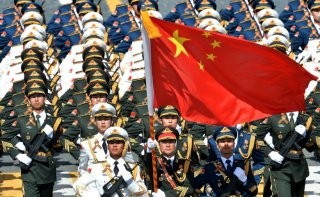China's 'Doves' Break Cover to Criticize Foreign Policy
The open duel between China’s leading dove and hawk is a clear indication that the country’s internationalists and reformers are worried about the country’s foreign policy direction.
The Global Times is one of the favorite publications for Western journalists and pundits on China. The nationalist tabloid is known for its hawkish stance and colorful English language. If you are looking for a punchy quote, the Global Times never disappoints.
The paper’s editor-in-chief Hu Xijing has a cult following in China. He is both reviled and loved. For the country’s liberals, Hu is the embodiment of China’s ills, nationalistic and ideological. For his followers, his hawkish worldview resonates strongly with their nationalist instincts.
Worryingly, China’s foreign policy increasingly resembles The Global Times’ firebrand nationalist editorials, especially in relation to the South China Sea disputes. One of China’s best known retired diplomats, Wu Jianming, a former ambassador to France, has hit back at Hu and his brand of xenophobic nationalism.
The spat between Wu and Hu has attracted widespread coverage and discussion in China, from nationalist tabloids to progressive publications like Caixin. Wu, who was a former interpreter for Chinese leaders including Mao and Zhou Enlai, penned several scathing columns critical of Hu and China’s rising tide of nationalism.
The former ambassador made three critical points in an op-ed piece for Caixin, a respected and progressive business publication. He challenges the notion that China is a victim of globalization. It is not uncommon nowadays to see news reports and opinion pieces that describe China as a victim of international cooperation and engagement.
Nationalists have decried how ruthless Western capitalists have exploited hopeless Chinese workers. Wu argues China has no choice but to open itself up for international capital and technology; China is a beneficiary of international engagement, not a victim. By portraying China as a victim, it is in essence a repudiation of the whole policy of reform and opening up,' he wrote.
Wu reserves his strongest condemnation for the increasingly popular idea that China should resort to military forces to settle its disputes with its neighbors including Japan. He notes that many neighboring countries are becoming increasingly mistrustful, anxious and even threatened by China.
He argues the former paramount leader Deng Xiaoping has laid a successful formula to deal with current disputes, which is set aside disputes and exploit resources jointly. He argues strongly that war will not solve any problems and China should never follow the footsteps of the US. China should resolve its disputes with neighboring countries peacefully and through negotiation.
He points out that China has successfully settled land border disputes with 12 neighboring countries. It is interesting to note that Prime Minister Malcolm Turnbull also made this point before he became PM.
In the past few years, many multi-nationals have becoming increasingly vocal about China’s deteriorating business environment. Beijing is using excuses such as national security and competition laws to punish and exclude foreign companies from operating successfully in China.
Wu is very concerned about this trend and argues that China’s development cannot be separated from foreign multi-nationals. "They bring us advanced ideas, they bring us cutting-edge technology and management know-how," he said, "to oppose foreign multi-nationals, is akin to oppose advanced technology and we will bring misery to ourselves."
In summary, Wu argues xenophobic nationalism is a dangerous repudiation of Deng’s policy of reform and opening up. It is disruptive to China’s relationship with the global community. 'It is an effort to drag China backward, towards isolation and stagnation. If China wants to march towards future, it has to continue the policy of reform and opening up and abandon xenophobic nationalism,' he argues.
Predictably, Hu has labelled the former ambassador as typical ‘dove' who is afraid of offending foreigners. He defends The Global Times’ editorial policy as a ‘positive’ asset for China’s foreign policy and part of the broader national discussion about China’s place in the world.
However Wu is not alone in this crusade. Guo Shuqing, the governor of Shandong province and a former Chairman of China’s Securities Regulatory Commission has also warned about the twin dangers of nationalism and populism. He criticised young nationalists who attacked Japanese businesses during popular protests in 2012.
In a controversial speech last year about China falling into the middle income trap. Chinese finance Minister Lou Jiwei also strongly defended the country’s policy of continuous international engagement, saying China is the biggest beneficiary of the WTO ascension in 2000. During the speech, he also advocated abandoning the country’s autarkic food policy, urging the government have confidence in the security of international market, and to worry less about potential conflicts.
The open duel between China’s leading dove and hawk is a clear indication that the country’s internationalists and reformers are worried about the country’s foreign policy direction. Some are urging the central government to refrain from playing with the destructive and unpredictable force of nationalism and foreign policy adventurism. Lets hope their voices will be heard and their warnings heeded.
This piece first appeared in The Lowy Interpreter here.
Image: Office of the President, Russian Federation.

